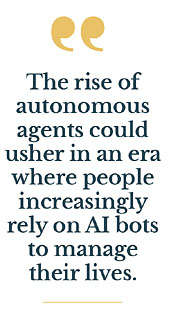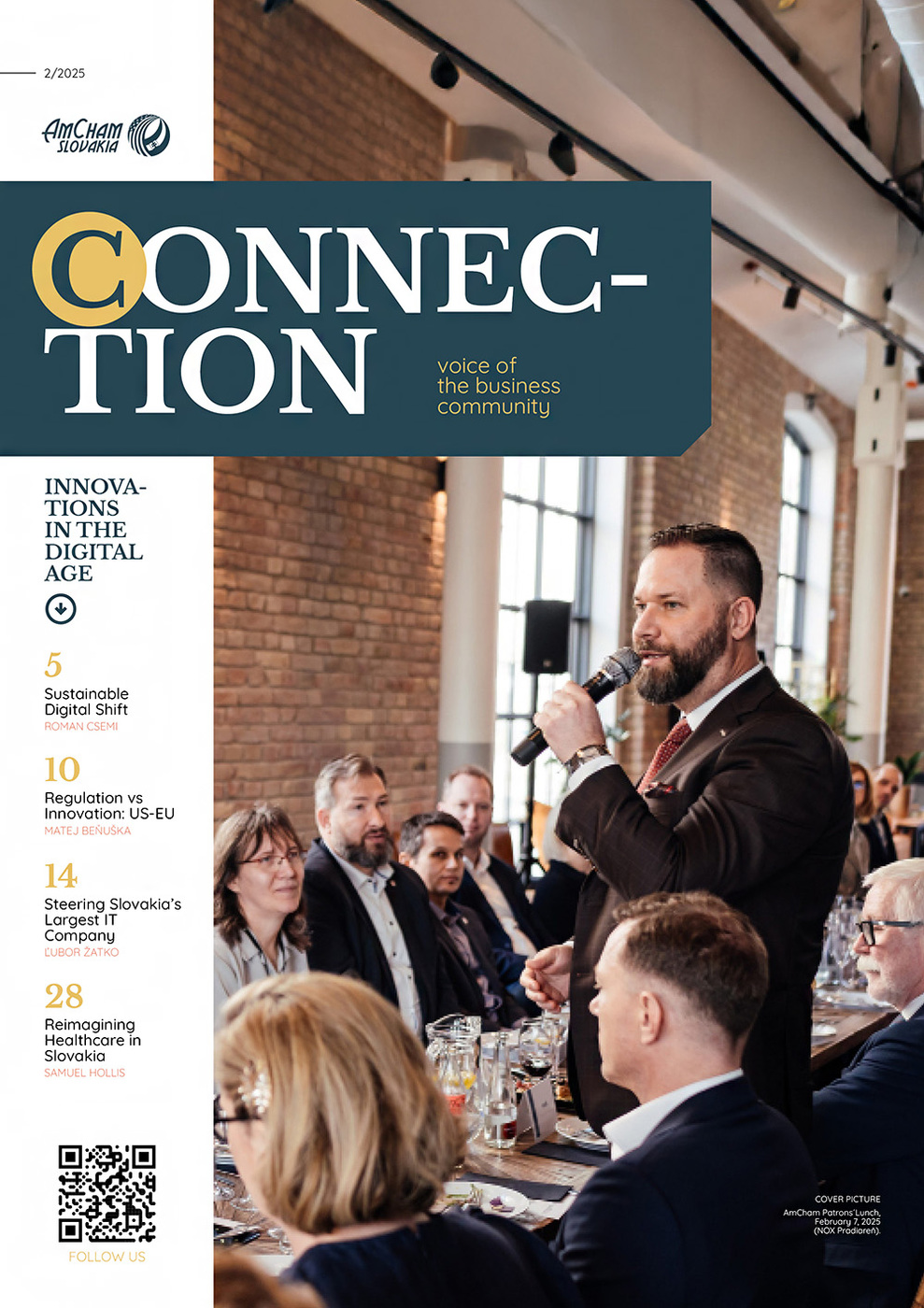Agentic AI turbocharges the ‘Do It For Me’ (DIFM) economy, which could reshape how services are accessed and markets function. These systems won’t just assist users, but act on their behalf, handling complex tasks, negotiating deals and optimizing outcomes in real-time.
Corporate references to agentic AI surged 17x in 2024 – and this trend is poised to accelerate in 2025. Investment is following suit – 37% of venture capital funding in 2024 flowed into AI startups, marking an all-time high.1
Your Own Digital Jarvis
The rise of autonomous agents could usher in an era where people increasingly rely on AI bots to manage their lives. Instead of prompting LLMs with one-line instructions, we can rely on intelligent digital assistants embedded with advanced capabilities.
These bots, equipped with sophisticated algorithms and access to vast amounts of data, will negotiate with counterparties to secure the best possible deals for users. This shift will not only streamline services but also ensure decisions are made with a level of precision and foresight that humans may not have.
Consumers may no longer need to spend time gathering information, comparing different items, or executing tasks. Instead, they are likely to focus on yes/no/switch decisions, while AI handles the legwork.
Agentic AI in Finance
Consider mortgage renewals: rather than manually searching for rates, an AI agent could track mortgage expiration dates, analyze market conditions, compare loan products, negotiate with lenders for optimal terms, and automate paperwork. Initially, users may require AI agents to seek human confirmation before executing financial decisions, but as trust grows, more tasks can be handled autonomously.
In this new paradigm, the critical decision for consumers will be selecting the right bot. Choosing bot-powered advisers, much like choosing human personal finance advisers, will become a key task. But who will the bots work for – BigTechs, trusted institutions such as banks, or startups?
Leading banks will likely opt to provide their own AI-powered services. But BigTechs may have a competitive advantage in terms of being digitally native and having faster go-to-market speed. In some markets, they may also have stronger consumer brands.
Smaller firms and startups may see their growth turbocharged by the growth of agents. AI may dramatically improve their reach. But will consumers want to spend too much time thinking about which agent to use? We are likely to default to known and trusted brands.
Supercharge Knowledge Workers
Beyond finance, agentic AI is transforming knowledge work at scale. Much like the printing press democratized information, AI is decentralizing access to knowledge and creativity. With AI agents, a single professional or a small team could achieve what previously required entire departments.
Repetitive tasks – data entry, reporting, compliance – are ripe for automation. While some jobs may be displaced, AI will also create new roles focused on AI development, ethics, governance and oversight. Industries centered on training, fine-tuning, and auditing AI systems will proliferate, making data curation and quality assurance critical growth areas.
Golden Age of Startups
Throughout history, general-purpose technologies – the steam engine, electricity, the internet – have reshaped economies. Will AI spark another wave of creative destruction or a retrenchment of current oligarchic capitalism?
In previous cycles, technology revolutions led to the rise of new firms. The steam engine era saw large factories and industrial businesses replace artisanal firms. Electricity further transformed mass production and urbanization. The first and second industrial revolutions ushered in a new era of banks and financial firms.
Similarly, the internet era from the 1990s onwards led to the emergence of new e-commerce, media and FinTech firms, while traditional players struggled to adapt. Some managed to transform and survive, such as independent bookshops in America.
Agentic AI could follow a similar pattern. Major cloud computing companies are investing billions in agentic AI, achieving trillion-dollar valuations. Yet, paradoxically, cloud computing also enables new entrants by lowering high fixed technology costs of competing with incumbents.
The combination of cloud, AI, and agents could trigger a further revolution in the delivery of digital services, including finance. Larger financial firms may move with caution due to cultural, regulatory, and technological constraints, but a new generation of risk-embracing startups may attempt to race ahead.
The Dark Side: Bad Bots & Deepfakes
With opportunities comes risk. The Global Anti-Scam Alliance estimated $1 trillion in losses to scams in 2023. The UK’s National Crime Agency ranked scams as the #1 form of crime.
Malicious AI agents could supercharge financial fraud. Unlike traditional rule-based bots, agentic AI systems are adaptive and autonomous, capable of evolving their strategies to deceive individuals and businesses at scale.
Already, half of all online traffic consists of bot activity, much of it malicious.2 As agentic AI advances, we could see a surge in sophisticated AI-driven scams. In 2025 and beyond, fraud prevention will be fundamentally different because of the way fraudsters use AI. We will have an AI arms race between attackers and defenders.
***
- CB Insights, State of Venture 2024 Report, 07 January 2025 (www.cbinsights.com/research).
- Imperva (A Thales Company), Bad Bot Report, 16 April 2024.
Ronit Ghose, Head of Future of Finance, Citi Global Insights



Follow us